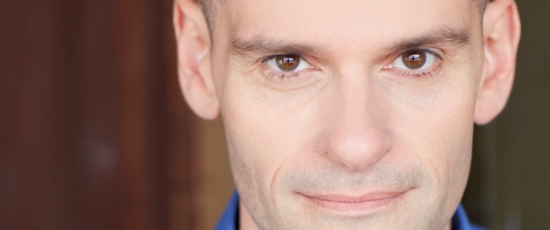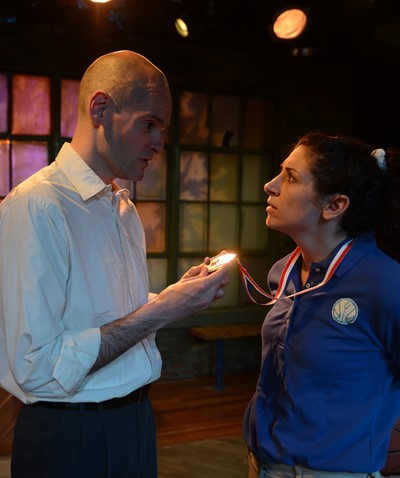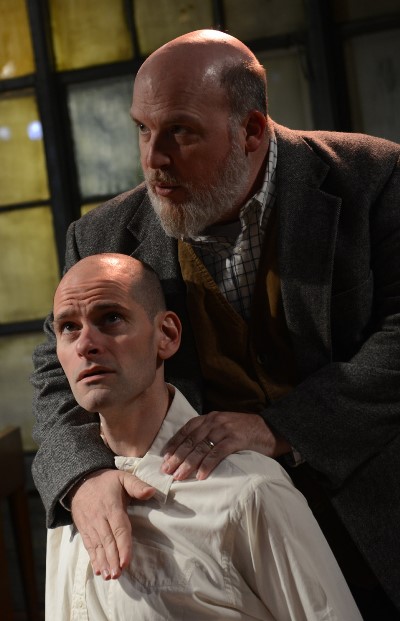Role Playing: Dave Belden, actor and violinist, adjusted pitch for ‘Charles Ives Take Me Home’
 Interview: Member of Chicago Sinfonietta with a stage background, actor portrays a musician at odds with his daughter in Jessica Dickey’s play at Strawdog, through June 21.
Interview: Member of Chicago Sinfonietta with a stage background, actor portrays a musician at odds with his daughter in Jessica Dickey’s play at Strawdog, through June 21.
By Lawrence B. Johnson
When Dave Belden took on the role of a violinist whose daughter wants nothing more than to play basketball, in Jessica Dickey’s “Charles Ives Take Me Home” at Strawdog Theatre, he saw himself as perfectly suited to the part. He plays in the Chicago Sinfonietta. What he had to overcome was his notion of himself as a fundamentally nice guy.
 “John is charming,” says Belden of the single-minded violinist he plays under the direction of Keira Fromm, “but he really isn’t too chummy, too friendly. He’s had bad relationships at both ends of his life – with his father, a sports nut who cared nothing about music, and now his daughter Laura. I’m a pretty affable guy. Keira and I worked hard at making me not so affable.”
“John is charming,” says Belden of the single-minded violinist he plays under the direction of Keira Fromm, “but he really isn’t too chummy, too friendly. He’s had bad relationships at both ends of his life – with his father, a sports nut who cared nothing about music, and now his daughter Laura. I’m a pretty affable guy. Keira and I worked hard at making me not so affable.”
That edge of abrasiveness is honed from the get-go, with John’s first speech – to the audience, about how much he likes breasts. His point is that an enthusiasm for breasts leads to begetting a child like Laura, who one day confronts her doting father with – what’s this? — breasts. And that’s confusing for a man.
This rumination is cast in somewhat more jarring terms, and Belden, whose extensive training as an actor includes studies in Chicago and England, says it instantly allows him to connect with his audience and to establish his unvarnished personality.
“It’s fun to gauge an audience’s reaction,” he says. “I’m scanning the audience, making direct eye contact while I’m saying all this and I can see the question in some faces: ‘Is he talking about me? This play is so reliant on that kind of interaction. It really cannot exist without an audience.”
 A memory play, “Charles Ives Take Me Home” looks back on the adult life of a man who struggles to connect with a daughter he cannot understand. Though Laura (played by Stephanie Chavara) is John’s delight as a child, she steadily pulls away from him as he refuses to engage her growing passion for basketball.
A memory play, “Charles Ives Take Me Home” looks back on the adult life of a man who struggles to connect with a daughter he cannot understand. Though Laura (played by Stephanie Chavara) is John’s delight as a child, she steadily pulls away from him as he refuses to engage her growing passion for basketball.
The iconoclastic American composer Charles Ives figures into all this through a chance meeting with John – when Ives, near the end of his life, appears as a substitute teacher during John’s student days at the Juilliard School. The young man has just lost his father, and Ives (Jamie Vann) briefly fills that void as mentor not only in music but also in life itself. In spirit — albeit a complicated one — Ives will hover in the background throughout John’s days.
“John reveres this great man, but he’s not really listening to him, anyway not the first time around” says Belden. “But later, when John ‘returns’ to their tutorial session, it’s like he’s hearing these things for the first time and realizing he wasn’t paying attention when he was 20 years old.
“Sometimes you hear what you want to hear and shut out what you can’t handle. John can’t handle his father’s death, so he latches onto Ives. But it took me a while to see the devolving relationship between John and Ives. It’s the same attitude he had toward his own father – rejecting him, denying him, fighting against him. It also parallels his relationship with Laura.”
 The idea of meeting an iconic figure like Charles Ives piqued Belden’s imagination. As a professional musician, a graduate of Northwestern University, Belden’s actual knowledge of Ives’ music was based on a few of his best-known works such as “The Unanswered Question” and “Central Park in the Dark.” While, in the play, John’s familiarity with Ives is greater, Belden says he could put himself in John’s shoes at such a meeting.
The idea of meeting an iconic figure like Charles Ives piqued Belden’s imagination. As a professional musician, a graduate of Northwestern University, Belden’s actual knowledge of Ives’ music was based on a few of his best-known works such as “The Unanswered Question” and “Central Park in the Dark.” While, in the play, John’s familiarity with Ives is greater, Belden says he could put himself in John’s shoes at such a meeting.
“It’s that thing that happens with heroes: What would I say, would they like me, would I learn from them? John thinks they’re going to talk about music, but Ives quickly shuts that down. He wants to talk about something else entirely – life, and the recent death of John’s father.
“When I first read the play, I’m turning pages thinking, ‘Wow! This is me.’ At least the music parts. I saw myself back at Northwestern in master classes and tutorials. I listened to all of Ives’ music referenced in the play. When I hand him the stack of scores at our meeting, that’s the music I’d actually been studying.”
But “Charles Ives Take Me Home” finds John examining his life from both directions, reflecting on his past and grappling with what might be called the evolving present. It is all deeply conflicted.
 “One of the things Keira (the director) talked about was the whole idea of John’s dream for Laura – his hope to make her an artist. He wants to provide her with the tools, the education and the inspiration to be an artist like him. And he fails miserably at it. But he keeps hoping he can ignite that flame. He’s never able to take the basketball thing seriously.”
“One of the things Keira (the director) talked about was the whole idea of John’s dream for Laura – his hope to make her an artist. He wants to provide her with the tools, the education and the inspiration to be an artist like him. And he fails miserably at it. But he keeps hoping he can ignite that flame. He’s never able to take the basketball thing seriously.”
In the end, John is able to view his life and his daughter’s with calm objectivity. That final assessment, says Belden, is the hardest stretch to get through.
“The first time I read that last scene, I was crying but also thinking, ‘This can’t work.’ I had real concerns about how it would actually play. And at our first group reading, everybody was in tears at the end. It’s the first play I’ve ever done where I couldn’t help crying.
“As actors, we want to be emotional, but if we lose it, the play doesn’t work for the audience. Keira really worked at keeping me focused on getting through to Laura, never wallowing or being sentimental. That’s the challenge, and it’s a tricky line.”
Related Link:
- Review of ‘Charles Ives Take Me Home’: Read it at ChicagoOntheAisle.com
More Role Playing Interviews:
- Joseph Wiens starts at full throttle to convey alienation of ‘Look Back in Anger’
- Shane Kenyon touches charm and hurt of lovable loser in Steep’s ‘If There Is’
- Ramón Camín sees working class values in Arthur Miller’s tragic Eddie Carbone
- Hillary Marren’s charming, rapping witch in ‘Woods’ shapred by hard work, free play
- Mary Beth Fisher embraces both hope, despair of social worker in ‘Luna Gale’
- Brad Armacost switched brothers to do blind, boozy character in ‘The Seafarer’
- Karen Woditsch shapes vowels, flings arms to perfect portrait of Julia Child
- Ora Jones had to find her way into Katherine’s frayed world in ‘Henry VIII’
- Kareem Bandealy tapped roots, hit books for form warlord in ‘Blood and Gifts’
- Eva Barr explored two personas of Alzheimer’s victim to find center of ‘Alice’
- Darrell W. Cox sees theater’s core in closed-off teacher of ‘Burning Boy’
- Chaon Cross turned Court stage into a romper room finding answers in ‘Proof’
- Dion Johnstone turned outsider Antony to bloody purpose in ‘Julius Caesar’
- Noir films gave Justine Turner model for shadowy dame in ‘Dreadful Night’
- Anish Jethmalani plumbs agony of good man battling demons in ‘Bengal Tiger’
- Gary Perez channels his Harlem youth as quiet, unflinching Julio in ‘The Hat’
- Kamal Angelo Bolden sharpened dramatic combinations to play ‘The Opponent’
- In wheelchair, Jacqueline Grandt explores paralysis of neglect in ‘Broken Glass’
- James Ridge thrives in cold skin of Shakespeare’s smiling serpent, Richard III
- Stephen Ouimette brews an Irish tippler with a glassful of illusions in ‘Iceman’
- Ian Barford revels in the wiliness of an ambivalent rebel in Doctorow’s ‘March’
- Chuck Spencer flashes a badge of moral courage in Arthur Miller’s ‘The Price’
- Rebecca Finnegan finds lyrical heart of a lonely woman in ‘A Catered Affair’
- Bill Norris pulled the seedy bum in ‘The Caretaker” from a place within himself
- Diane D’Aquila creates a twice regal portrait as lover and monarch in ‘Elizabeth Rex’
- Dean Evans, in clown costume, enters the darkness of ‘Burning Bluebeard’
- Dan Waller wields a personal brush as uneasy genius of ‘Pitmen Painters’
- City boy Michael Stegall ropes wild cowboy in Raven Theatre’s ‘Bus Stop‘
- Brent Barrett is glad he joined ‘Follies’ as that womanizing, empty cad Ben
- Sadieh Rifai zips among seven characters in one-woman “Amish Project”
- Kirsten Fitzgerald inhabits sorrow, surfs the laughs in ‘Clybourne Park’
- Janet Ulrich Brooks portrays a Russian arms negotiator in ‘A Walk in the Woods’
Tags: Charles Ives Take Me Home, Dave Belden, Jamie Vann, Jessica Dickey, Keira Fromm, Stephanie Chavara, Strawdog Theatre


No Comment »
3 Pingbacks »
[…] Dave Belden, actor and violinist, adjusted pitch for ‘Charles Ives Take Me Home’ […]
[…] Dave Belden, actor and violinist, adjusted pitch for ‘Charles Ives Take Me Home’ […]